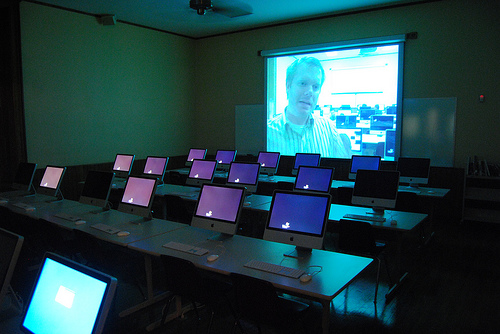Everyone deserves an education. This is something almost everyone in America is in agreement about. Do we let people of color and women, two often marginalized groups, fall behind in a field that will be incredibly important in the global future?
In a recent Education Week article, researcher Barbara Ericson found that, although 30,000 students total took the Advanced Placement (AP) exam for computer science in 2013, less than 20% of those students were female, around three percent were African American, and eight percent were Hispanic. In fact, no African American students took the exam in 11 out of 50 states. Zero Hispanic students took it in eight states.
I immediately wanted to understand more. As a young man of color who had the opportunity to take numerous computer programming classes but didn’t, I was interested to discover that I was part of a much larger trend.
I decided to go back to my old high school and discuss the ramifications of this article with a man who actually taught an Advanced Placement computer science course, Sean Morris.
“We’ve looked at that a lot here in this high school and we think we’re not encouraging students of color or minority students to take AP classes early on,” he explained. “I think people don’t know what computer science is. We know from research that students tend to identify as either technical or non-technical when they’re in middle school,” and he said this self-selection makes it more difficult for staff to get many students to enroll in computer science classes.
AP Computer Science is a class that is saturated with computer programming. “It’s very ‘mathy’ or algorithm-centric. We really work on the nuts and bolts of programming,” said Morris.
That’s what drove me away. I never even considered computer sciences as a class that I would succeed in. And with only four years to achieve a solid GPA, there was no real opportunity to take a class just because it had real world ramifications. Especially if it meant disappointing myself or my mother.
But there are some national attempts to combat this problem. Mr.Morris is part of a network of computer science teachers dedicated to expanding “participation in computer science by appealing to a broader group of students, particularly women and minorities.” The biggest solution they’ve come up with is a new kind of computer science course, focused more on the “social and cultural impact in terms of solving major problems as well as ethical issues, security, privacy, and these kind of pieces,” he said. This course is specifically designed to engage more minority students by focusing on the bigger picture on how computers will be used to solve current global issues, coupled with the way algorithms work.
And these new classes cannot come fast enough. The current gap that exists has already created a series of problems. For example, the tech world is often perceived as a boys only club. I’ve read numerous reports of sexual harassment and racism in the tech world, which lessens my desire to join the world of computer science. And if the computer science field affects everyone, why should the technologies coming out of it only represent the desires of the few?
As far as joining the computer science field, I wish I had taken those classes when I was younger. But I also believe that a stronger effort needs to be made in order to convince people to join those classes, showing them the way that programming and software editing can influence the world around them.
Mr. Morris agrees with me. “I think what we need to teach in middle school is a lot more of what computer scientists do, and not try to [turn them into] software engineers,” he said. “Let them have fun, let them see what it is, and we can teach them once they’re into it,” he added.
